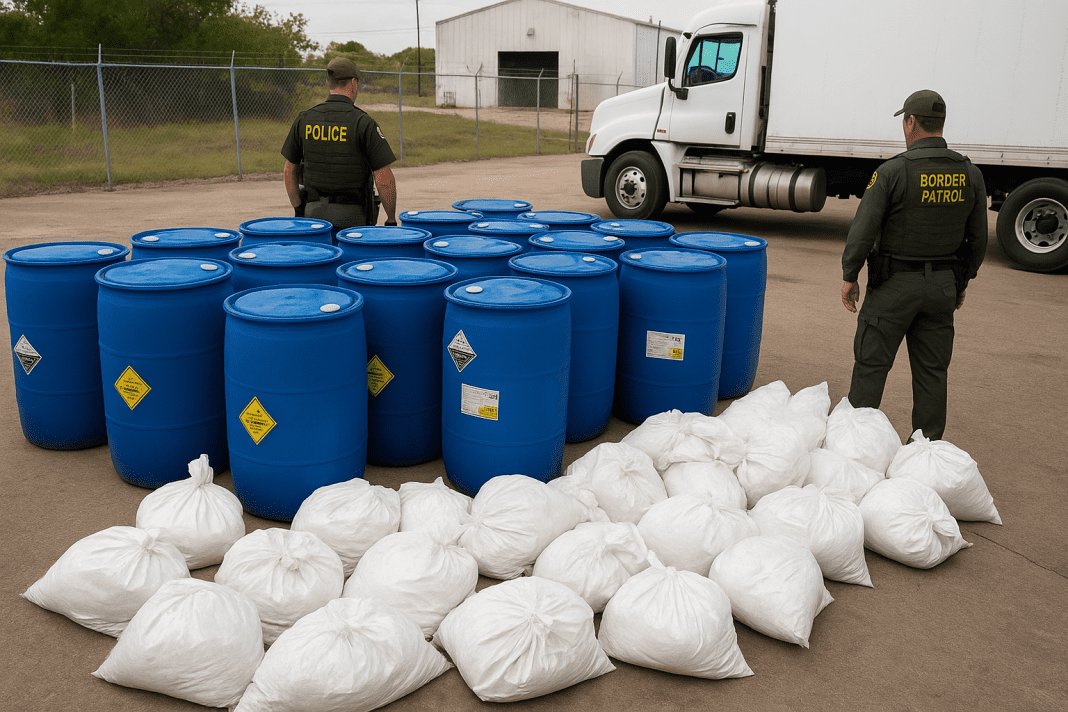Authorities intercepted large shipments of chemicals bound for a notorious Mexican drug cartel. These chemicals contained key ingredients often used in producing illegal narcotics, not ordinary items found in everyday trade. By stopping these shipments, investigators prevented the production of thousands of harmful drug doses from ever reaching the streets.
Chemicals Intercepted Before Reaching Cartel Hands
A detailed and lengthy investigation led to the seizure. Law enforcement discovered that traffickers were secretly transporting the chemicals through multiple countries. If the cartel had obtained them, the cartel could have converted the materials into dangerous substances and distributed them across international markets. By intercepting these chemicals, investigators disrupted a major supply chain that the cartel relied on for its drug-making operations.
International cooperation played a central role in this operation. Homeland Security investigators worked side by side with law enforcement agencies in Guatemala, Panama, and Mexico. Once they identified the shipments, they consolidated them in Panama. From there, they diverted them to Houston, Texas, and prevented them from reaching cartel-controlled territories. This careful coordination ensured that investigators secured the chemicals before the cartel could use them.
Sheinbaum rejects U.S. airstrike talk on cartels; vows to defend Mexico sovereignty
Officials further explained that the seizure was made possible through a unique legal measure. A special executive order allowed major cartels to be classified as foreign terrorist organizations. With this classification, investigators were able to act quickly and seize property linked to the cartel in different countries. This gave them the authority to track shipments globally and stop them wherever they were found.
Strong International Collaboration Against Cartel Operations
The investigation underscored how international teamwork is necessary to combat powerful cartels that operate across borders. Agents working in Guatemala, Panama, and Mexico provided essential intelligence to the team in Houston. Their support made it possible to trace the shipments’ movements and confirm their connection to the cartel.
The international task force functioned under the umbrella of Homeland Security investigations. By exchanging information and coordinating strategies, these agencies managed to stop the flow of chemicals across several countries. Each nation’s law enforcement played a role in ensuring the shipments never reached the cartel. This type of cross-border collaboration is often the only way to confront global criminal networks.
Shadow bank moved R$46 billion for cartel in one of Brazil’s biggest financial scandals
Authorities stressed the importance of this success. When dangerous chemicals are blocked from reaching cartels, entire communities are protected. Preventing drug cartels from gaining access to key materials directly reduces the production of narcotics. This, in turn, decreases the availability of harmful substances that fuel addiction and violence. The outcome of this operation proved that coordinated efforts can significantly weaken the influence of cartels.
The investigation also highlighted the scale of cartel operations. These organizations rely on international smuggling routes, hidden supply chains, and covert networks to acquire the chemicals they need. Stopping even one shipment can create a major setback for a cartel’s drug production process. By striking at the supply chain, law enforcement disrupted a critical stage of the cartel’s illegal business.
Legal Authority Enabled Swift Seizure of Shipments
The legal foundation of this operation played a key role in its success. The executive order that identified cartels as foreign terrorist organizations gave investigators new and stronger tools. With this authority, officials seized shipments without delay and ensured that cartel-linked chemicals did not slip through legal loopholes.
The task force used such powers against the Sinaloa cartel for the first time. Because of the new designation, the task force did not limit its actions to the United States. Instead, it extended its reach into other countries and targeted cartel-related shipments wherever it found them. This wider scope gave law enforcement a decisive advantage in combating cartel operations.
US Navy increases P-8 Poseidon patrols near Venezuela as Washington seeks to curb cartel trafficking
The seized chemicals were described as highly significant to the cartel’s operations. Without them, the cartel faced difficulties in producing large quantities of illegal drugs. By intercepting these shipments, authorities not only removed dangerous substances from circulation but also cut off a vital source of supply for the cartel.
Officials pointed out that the operation showed how homeland security efforts function in practice. Teams from different countries and agencies combined their strengths to stop dangerous items from reaching criminal hands. The mission remained focused on keeping communities safe and reducing the destructive power of international cartels.

